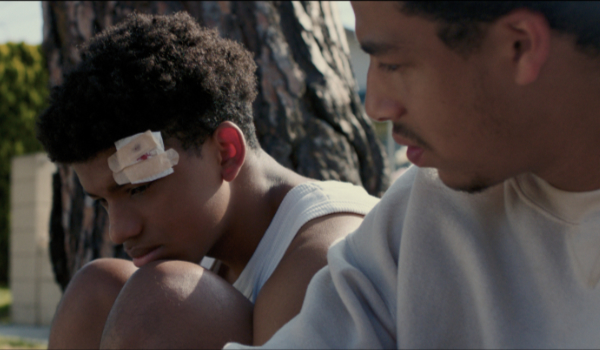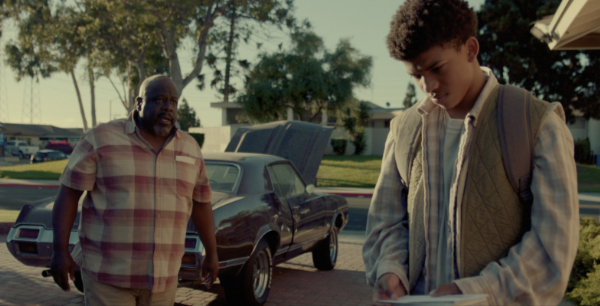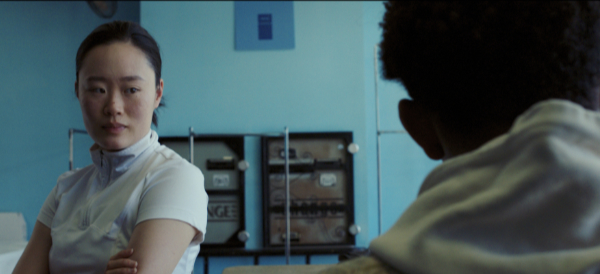To movie-going audiences who like to have everything wrapped up in a nice little bow by the end will be sorely disappointed in this film. It doesn't give answers. Instead, it gives hope. How I Learned to Fly hits select theaters on December 1st.
In How I Learned to Fly, Daniel (Marcus Scribner) is the older of two African American teenagers, together with his brother, Eli (Lonnie Chavis). Daniel, who narrates throughout the film, remembers the rules his Mom, Dorothee (Cyrstal Bush), had for them. She told them, "Negativity is not allowed in this house. It's like crack, highly addictive and everywhere." She even wrote rules on the ceiling above Eli's bed so he can read them before going to sleep: we don't steal, we don't lie, we don't drink, we dress well, we love and respect each other, we go to school, we pay our bills on time, etc. Sounds like good advice.
This brilliantly crafted film gives us a glimpse into a hard life. Daniel is supporting his little brother, washing dishes in a restaurant after school and taking what's left on plates home to feed Eli. The audience is left wondering what happened to the parents. Daniel narrates that his Dad (Cliff 'Method Man' Smith) left but it's not clear what happened to Mom.
Whatever it is, Eli is clearly traumatized and stutters when he speaks, which isn't often, much to Daniel's frustration. He seems to find solace in leaving messages on his Mom's voice mail, but she never responds.

Lonnie Chavis as Eli and Marcus Scribner as Daniel in "How I Learned to Fly." © 2023 Film Movement. All Rights Reserved.
Next door neighbor, Louis (Cedric the Entertainer), drops pearls of wisdom, trying to coax Eli out of his shell by having him help fix the car. As they work, Louis tells Eli, "The more love you give, the more love you get back. That's the law. That's how the universe works." Louis also provides a meal now and then.
When Daniel can no longer pay the rent, the boys move into the car. Carrying the burden of keeping Eli's spirits up, he tells Eli that they're not homeless because they will always have each other.

Cedric the Entertainer as Louis and Lonnie Chavis as Eli in "How I Learned to Fly." © 2023 Film Movement. All Rights Reserved.
How I Learned to Fly gives the audience a fly-on-the-wall look into a situation that should bring us to righteous anger at the plight of these boys and so many like them. Daniel and Eli are on the outskirts of "normal" society through no fault of their own. How do they keep up hope? In their journey, they encounter people who show compassion and care. There's quirky Yaya (Michele Selene Ang) who lets them use the shower in her laundromat and Officer Luz (Adrian Quinonez) who's amazed that these homeless kids are doing their school work, and Daniel's co-worker who promises to keep providing some food for them after his uncaring boss fires him.

Michele Selene Ang as Yaya in "How I Learned to Fly." © 2023 Film Movement. All Rights Reserved.
The compassion shown to Daniel and Eli is the same compassion we can show to those in need around us. Perhaps we aren't called to take the homeless in off the street, but we can show compassion and love by helping as we can and treating them as the people they are, loved by God. Maybe in this way, we can be the means of bringing hope into the lives of those who desperately need it.
About the Author
Sister Hosea Rupprecht is a member of the Daughters of St. Paul, a religious community dedicated to evangelization with the media. She holds a Master of Theological Studies degree from the University of St. Michael’s College in Toronto and an MA in Media Literacy from Webster University in St. Louis.
Sr. Hosea is director of the East Coast office of the Pauline Center for Media Studies, based in Staten Island, NY, and speaks on media literacy and faith to catechists, parents, youth, and young adults. Together with Father Chip Hines, she is the co-host of Searchlight, a Catholic movie review show on Catholic TV. Sr. Hosea is the author of How to Watch Movies with Kids: A Values-Based Strategy, released by Pauline Books & Media.
For the past 15 years, she has facilitated various film dialogues for both children and adults, as well as given presentations on integrating culture, faith and media.